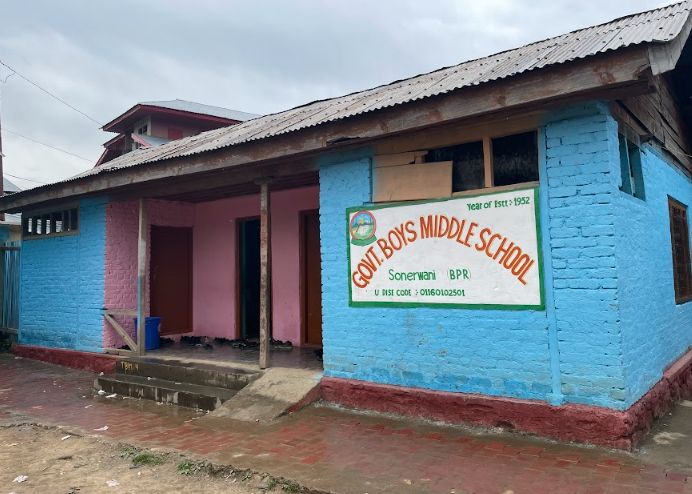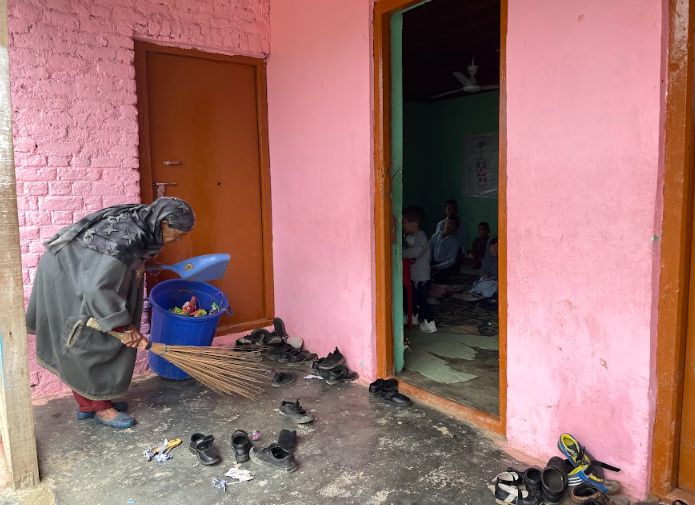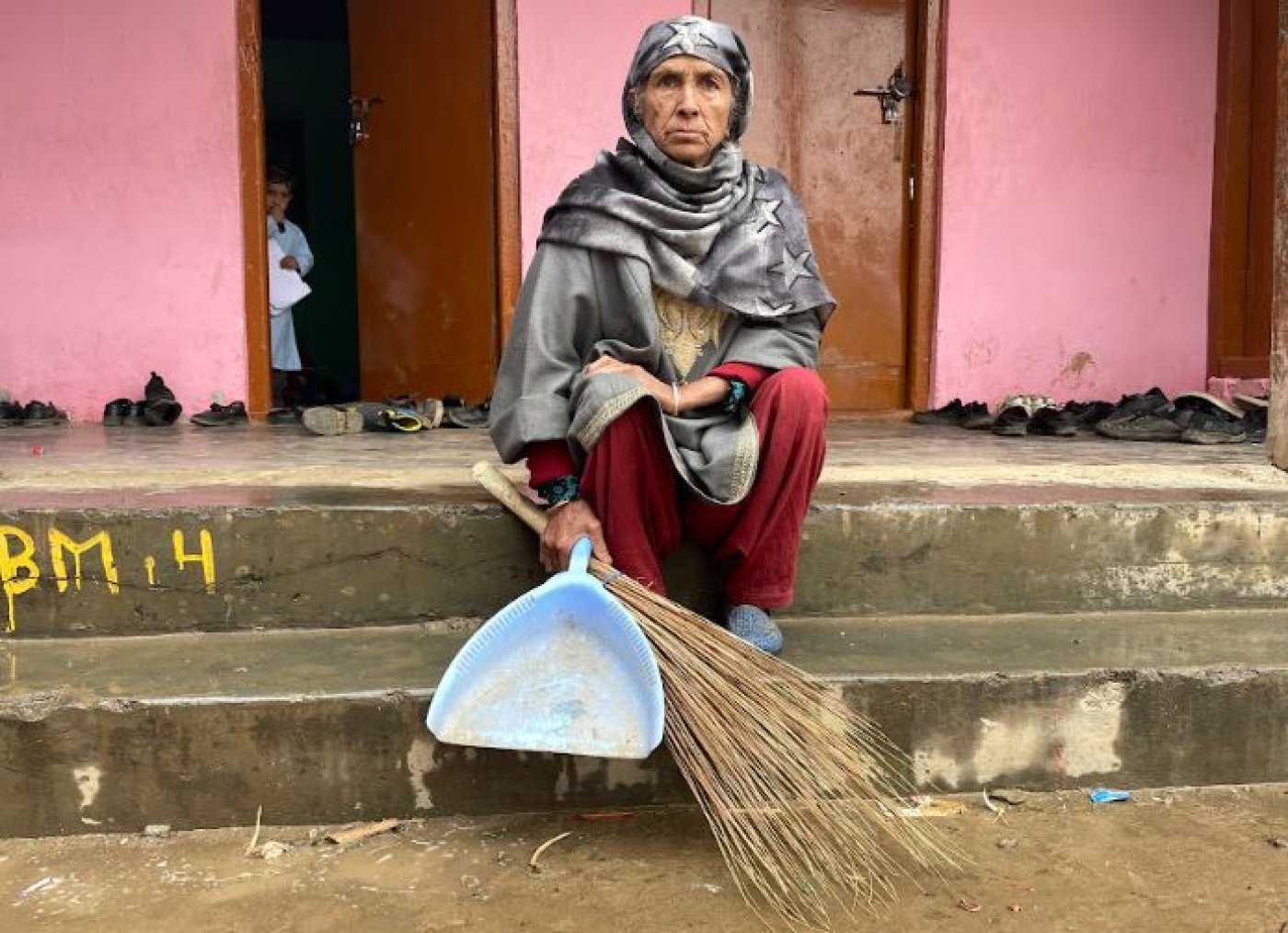Bandipora: As the sun rose, Nisara Begum, a 67-year-old Kashmiri woman, said goodbye to her 32-year-old daughter, who suffers from a mental disorder, and set off to fulfil her duties as the sweeper of a government school for boys here in north Kashmir, 55 km north of the capital Srinagar.
Closing the old wooden door of her traditional Kashmiri house as if to shield her daughter from the outside world, Nisara walked to the school, a small building of blue bricks on the banks of a stream, a km from where she lives in the Sonarwani village, nestled amid the snow-capped Himalayas.
Sonarwani lies along the path that was once a crucial link between north India and central Asia on the ancient Silk Road.
Nisara received Rs 25 when she started working at the Government Middle School Sonarwani in 1995 as a contingent paid worker (CPW), which includes sweepers, guards, and cooks working in government schools.
Concerned neighbours said they visited the chief education officer of Bandipora, who directed the zonal education officer to inform the school to increase her wages to Rs 75.
Nisara said she received this amount for four months, from April to August 2016, but then the payments stopped, and she has yet to receive wages for almost seven years.
In May 2023, TwoCircles also reported Nisara’s case along with Shakeela Begum, a mother of three, a sweeper in a primary school in Handwara district for 24 years who used to get Rs 30 every month.
Abdul Salam, an elderly neighbour, told Article 14 that Nisara had been struggling after she stopped getting paid, but a few teachers gave her some money.
Nisara’s eyes welled up with tears as she spoke of how poorly she has been compensated for the past three decades despite her commitment to keeping the school clean.
“It is barely sufficient to meet my basic needs,” said Nisara.
"In my dreams, I yearn for a day when my hard work finds true appreciation, and the dignity of my efforts is recognised,” she said. “Until that day comes, I will persistently sweep away the shadows, clinging to the hope of discovering a glimmer of light amidst the prevailing darkness.”
Abdul Majid Malik, the district's chief education officer, said that the J&K government had implemented a policy in the eighties to regularise CPWs if they had passed class eight.
Malik said there was no provision for a policy or increment in the monthly honorarium for individuals with qualifications below class eight or those who have crossed the age of sixty.
Nisara, who never went to school, did not qualify.
Nisara’s husband divorced her in 1992. Her son, suffering from anxiety and depression, died of a cardiac arrest in 2021. She was left to provide for her daughter.
"I lost my only son, and my husband vanished long ago," she said. "The sudden demise of my son shattered me. My mentally unsound daughter is my sole family, and we reside in a small room with my brother. I am thankful for his support, but I can't help feeling ashamed of being a burden on his family.”
A Big Problem
Thousands of workers have repeatedly gathered outside the Srinagar press enclave since 2017, demanding to be included in a regularisation policy. They have appealed to the administration of lieutenant governor Manoj Sinha, but nothing has changed.
Newsclick reported that around 7,500 CPWs have been working without wages for years. Some have reportedly donated land to the education department in the hope of getting paid.
Shabbir Ahmad Bhat of Kulgam told the website that he had donated one kanal, about 5,400 sq ft, of land to the education department for a school but had yet to be paid for five years.
In April 2023, the Jammu and Kashmir High Court ordered the government to “release wages withheld since 2017 and to implement the Minimum Wages Act with a further direction upon respondents to allow petitioners to continue their services till their cases are considered for regularisation…”
Under the Act, unskilled workers would be paid Rs 311 per day for unskilled workers, Rs 400 for semi-skilled, Rs 483 for skilled staff, Rs 552 for highly skilled and Rs 449 for administrative/ ministerial workers.
“All the process was done, but the case still lies in the finance department of J&K unexecuted,” Abdul Ghani, state president of All J&K Contingent Paid and Cook Education Employees Union, told TwoCircles in May.
Ghani told Article 14 the government has not yet implemented the court order.
“During the 2016 uprising and the subsequent COVID-19 crisis, the CPWs were assigned their responsibilities at their respective schools,” said Ghani. “However, despite their unwavering commitment and the hardships they endured, the government has yet to acknowledge their suffering.”
In 2011, the National Conference government implemented a directive known as SRO 308. Under this directive, the education department was instructed to employ CPWs in two ways: through the SSRB (Service Selection Recruitment Board) and through direct recruitment within the department. Following the guidelines of SRO 308, CPWs were hired after the formation of the departmental promotion committees in 2013 and 2017.
However, since 2017, under the former People's Democratic Party (PDP) and Bharatiya Janata Party(BJP) government, the education department has not given more promotions or paid their salaries.
Policy Upon Policy
The PDP-BJP government introduced another policy on 21 December 2017, known as SRO-520, to allow the regular engagement of casual labourers, daily-rated workers, seasonal workers, ITI-trained workers, and those ad-hoc/contractual/consolidated workers who did not meet the eligibility criteria outlined in the J&K Civil Services (Special Provision) Act, 2010.
According to the policy, workers in the categories of casual, seasonal, and others were eligible for a monthly remuneration ranging from Rs 10,000 to Rs 24,000. However, this was contingent upon their 10-year engagement period and their minimum educational qualification of class 8.
The policy classified the workers into skilled and unskilled categories for remuneration and other associated benefits.
Before the policy was shelved in 2019, the empowered committee had recommended 578 workers from these categories for regular engagement.
After January 2019, the committee did not convene again, disappointing numerous daily-wage workers employed across various government departments.
Hundreds of employees, like Nisara, are still patiently waiting for the government to provide them with fair remuneration to fulfil their basic needs.
"We have been eagerly awaiting a decent income to support our families and meet our essential requirements,” she said. “It's disheartening to see our struggles overlooked while we continue to dedicate ourselves to our work. We hope the government recognises our plight and takes prompt action to ensure we receive the remuneration we deserve."
Finding A Solution
Nisara said that if she does not meet the class eight pass requirement, the government should consider finding an alternative solution for her case, given that she had dedicated her life to keeping the school clean.
Supporting Nisara’s point of view, a government teacher at her school said that fair payment was a recognition of a person's work and contribution to society.
“It's sad to see dedicated people like Nisara, who come from less privileged backgrounds, struggling to make enough money despite working hard. Their situation is unfortunate,” the teacher said, speaking on the condition of anonymity.
“We need a fair system that pays everyone equally, regardless of their origins or qualifications. It's important to fix these inequalities and treat people like Nisara, who have dedicated their lives to helping others with fairness and respect,” the teacher said.

Soldiering On
While speaking of her pride in her work, Nisara diligently swept away the debris left behind by blossoming flowers on the classroom floors.
"I carry a deep sense of responsibility for the children who attend this school,” she said. “I want to create a clean and hygienic environment for them, where they can thrive and flourish.”
Mehmoona Begum, a mid-day-meal worker in the same school, who has been a witness to Nisara's relentless pursuit, said that Nisara had approached local administration officials countless times, pleading for assistance.
“Her pleas fall on deaf ears. Her problems remain unaddressed, leaving her trapped in deep disappointment,” she said.
Hoping For Change
Nisara remembers the day in March 2016 when she overheard teachers at the school discussing that she could be getting a raise.
"The news filled me with hope that, after all these years, I might finally receive a well-deserved raise," she said.
Determined to determine whether the information was accurate, Nisara said she went to the headmaster's office and made further inquiries.
To her relief, the headmaster confirmed that she would get Rs 75 monthly instead of Rs 25.
“I understood that even a slight raise in my salary would make a remarkable difference in the lives of my daughter and me," she said.

Unchanging Reality
When her wages stopped four months after the meagre increase, Nisara was in an unfortunate predicament.
Safeera Bano, Nisara’s daughter, faces challenges with her mental health and needs monthly medical attention at a Srinagar hospital. Her treatment includes medication she relies on to find peace in her daily life.
At the same time, poverty and the uncertainty about money have taken a toll on Nisara’a mental health. There are days when she finds it difficult to get out of bed.
"I am growing older with each passing day, and the light in my eyes dims bit by bit,” she said. “The circumstances have reached a point where a mighty river flows near the school, and the relentless noise of its rushing waters pierces through my weary head, causing me daily anguish.”
Within the confines of her brother’s house, Nisara and her daughter persevere, their living situation unchanged.
"Every day, I witness my daughter's struggle, and my heart aches,” she said. “My daughter's well-being is my unwavering motivation, and I won't rest until her needs are met, even if it means fighting against the storm of adversity.”
Love & Admiration
However, Nisara’s tireless efforts to keep the school clean is well known in her village and have touched the hearts of teachers, students and people who live in the area, earning her the love and respect of the community.
Mohammad Sultan, a 50-year-old parent whose son attends the same school where Nisara diligently sweeps every morning, shared his admiration.
'I'm in my fifties now, and throughout all these years, I've never witnessed Nisara sitting at home on working days. She is the first to open the school gates in the morning and the last to close them in the evening,” said Sultan. “Her commitment to keeping every corner of the school premises clean is remarkable. Seeing that she doesn't receive the recognition she deserves is truly disheartening.”
(Sajid Raina and Seerat Basheer are Kashmir-based independent journalists.)
Get exclusive access to new databases, expert analyses, weekly newsletters, book excerpts and new ideas on democracy, law and society in India. Subscribe to Article 14.

